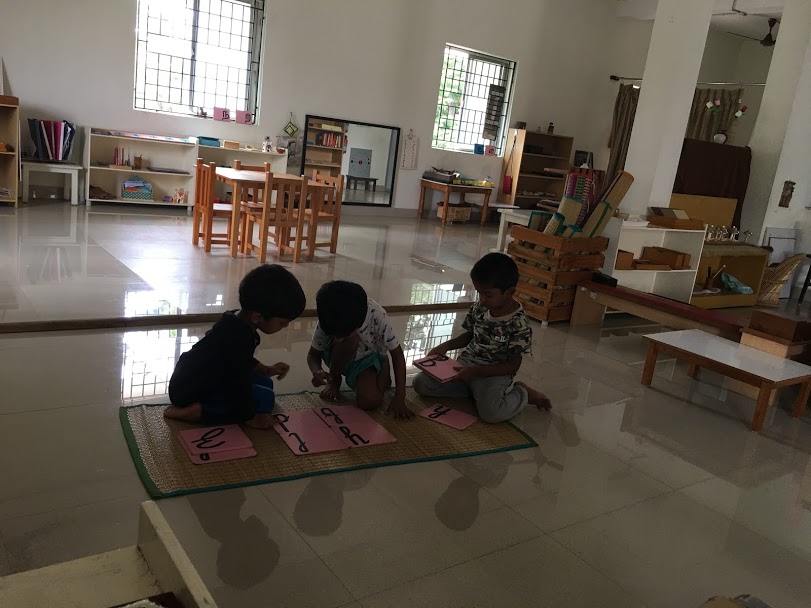CASA DEI BAMBINI PROGRAM
“Help me to do it by myself.”
The Casa program, for children ages 2½ – 6, encourages them to explore and discover, to collaborate with peers, and to take ownership of their education. The program encourages self-directed learning that promotes self-confidence, independent thought and action, and critical thinking while fostering social, emotional and intellectual growth.
Uninterrupted blocks of work time (typically 3 hours in length) allow children to work at their own pace and fully immerse themselves in an activity without interruption. Your child’s work cycle involves selecting an activity, performing it for as long it remains interesting, winding up the activity and returning it to the shelf as it was when taken, and making another work choice.
This cycle respects individual variations in the learning process, facilitates the development of co-ordination, concentration, observation, peer interaction, independence, and a sense of order while facilitating your child’s assimilation of information.
OUR GOAL OF THE CASA PROGRAM
"To serve each individual child in developing their will, social grace, and courtesy, refining their movements as they consolidate character traits obtained in the first three years of life while gaining on the key aspects of culture.”
The Environment
Specially designed learning materials are displayed on open shelves, easily accessible to the children. Classrooms also include low sinks accessible to the children, child-sized furniture, cozy spaces for quiet reading, reachable shelves with work available for free choice, and child-sized kitchen utensils so the students can prepare, eat and clean up their snack on their own.This approach to learning is “hands-on.”
Dr. Maria Montessori believed (and modern science has affirmed) that moving and learning are inseparable. In the prepared classroom, children work with specially designed manipulative materials that invite exploration and engage the senses in the process of learning.Children are gently guided to help maintain the organization and cleanliness of this environment to keep it orderly and attractive, and to help your child understand how to care for materials and clean up after themselves—skills you will be happy to observe carrying over in your home.The environment also facilitates the child's development of self-control through activities and daily life situations. The children observe the elder ones and slowly try to practice the same before becoming adept in understanding when they need to say what. The growing self-esteem and a firmly developed will combine within the child to help the child make decisions with clarity, follow through on them, accept mistakes, overcome them and move on accordingly.
LEADERSHIP
During the first 2 years in a Casa environment, children look forward to their turn to be a leader. In their third year they get their turn and take pride in being the oldest. They serve as role models for younger students, demonstrate leadership and citizenship skills. They reinforce and consolidate their own learning by teaching concepts they have already mastered to their peers and express confidence, develop self-esteem and self-sufficiency, and show responsibility.Children are then introduced to progressively more advanced Montessori materials and sophisticated, fascinating lessons. And they experience an important period in which their previous learning from working with concrete Montessori materials begins to become permanent knowledge. A Montessori student sees and feels their personal growth as they watch others learn the information they have mastered themselves.

What do children learn?
The Casa program follows a 3-year sequence. Because the teacher guides your child through learning at her own pace, her individualized learning plan may exceed the concepts she would be taught in a classroom environment in which all children learn the same concept at the same time.The Casa classroom offers your child 5 areas of study: Practical Life, Sensorial, Math, Language, and Cultural Studies.
Practical Life
Children learn daily-life skills, such as how to get dressed, prepare snacks, set the table, and care for plants and animals. They also learn appropriate social interactions, such as saying please and thank-you, being kind and helpful, listening without interrupting, and resolving conflicts peacefully.
Sensorial
Children refine skills in perceiving the world through their different senses, and learn how to describe and name their experiences—for example, rough and smooth, perceived through touch. Sensorial learning helps children classify their surroundings and create order. It lays the foundation for learning by developing the ability to classify, sort, and discriminate—skills necessary in math, geometry, and language.
Math
Through hands-on activities, children learn to identify numerals and match them to their quantity, understand place-value and the base-10 system, and practice addition, subtraction, multiplication, and division. They also explore patterns in the numbering system. With an exploratory approach, children do more than just memorize math facts; they gain a firm understanding of the meaning behind them.
Language
Activities throughout the Early Childhood classroom teach language, help children acquire vocabulary, and develop skills needed for writing and reading. The ability to write, a precursor to reading, is taught first. Using hands-on materials, children learn letter sounds, how to combine sounds to make words, how to build sentences, and how to use a pencil. Once these skills are acquired, children spontaneously learn to read.
Cultural Studies
A wide range of subjects, including history, geography, science, art, and music, are integrated in lessons in the cultural area of the curriculum. Children learn about their own community and the world around them. Discovering similarities and differences among people and places helps them develop an understanding and appreciation of the diversity of our world, and a respect for all living things.

